|
|
|
Sort Order |
|
|
|
Items / Page
|
|
|
|
|
|
|
| Srl | Item |
| 1 |
ID:
023139


|
|
|
|
|
| Publication |
2002.
|
| Description |
107-120
|
| Summary/Abstract |
The Bush administration's concept of international ‘leadership’ is, in foreign-policy circles, fairly conventional. Leadership means acting, and telling others how to act; it means taking the lead, sometimes alone, and recognising that others will come along once the course seems inevitable. Yet this particular concept contradicts every other theory of leadership in existence. Business-management literature can shed light on relations among states, for the best of this writing on leadership speaks to human nature. In a world where a nascent coalition of like-minded democracies is looking more and more like a true international community, states that aspire to global leadership will, increasingly, need to build consensus on the basis of a shared vision. This perspective strongly reinforces the call for greater multilateralism in US foreign policy.
|
|
|
|
|
|
|
|
|
|
|
|
|
|
|
|
| 2 |
ID:
082172
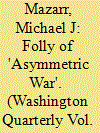

|
|
|
|
|
| Publication |
2008.
|
| Summary/Abstract |
Shifting U.S. defense policy to focus on asymmetric threats would distort defense priorities for years to come and trap U.S. armed forces in endless conflicts that military power cannot win.
|
|
|
|
|
|
|
|
|
|
|
|
|
|
|
|
| 3 |
ID:
076693
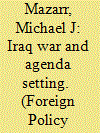

|
|
|
| 4 |
ID:
002204


|
|
|
|
|
| Publication |
Washington, Brassey's, 1990.
|
| Description |
xi, 180p.
|
| Series |
AUSA Institute of land warfare book
|
| Standard Number |
0080405657
|
|
|
|
|
|
|
|
|
|
|
|
Copies: C:1/I:0,R:0,Q:0
Circulation
| Accession# | Call# | Current Location | Status | Policy | Location |
| 033236 | 355.033573/MAZ 033236 | Main | On Shelf | General | |
|
|
|
|
| 5 |
ID:
078502


|
|
|
|
|
| Publication |
2006.
|
| Summary/Abstract |
The outcome of the North Korean nuclear saga has been held up as an example of the Bush administration defying its bellicose reputation and using multilateralism and diplomacy to defuse a crisis. But in fact, the story is one of extremely poor policymaking and a persistent failure to devise a coherent strategy -- with the result that North Korea has managed to dramatically expand its nuclear capability.
|
|
|
|
|
|
|
|
|
|
|
|
|
|
|
|
| 6 |
ID:
049097


|
|
|
|
|
| Publication |
Hampshire, macmillan Press, 1997.
|
| Description |
xii, 404p.
|
| Standard Number |
0333723694
|
|
|
|
|
|
|
|
|
|
|
|
Copies: C:1/I:0,R:0,Q:0
Circulation
| Accession# | Call# | Current Location | Status | Policy | Location |
| 039994 | 355.825119/MAZ 039994 | Main | On Shelf | General | |
|
|
|
|
| 7 |
ID:
149629
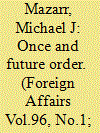

|
|
|
|
|
| Summary/Abstract |
Few foreign policy issues have attracted more attention in recent years than the problem of sustaining the U.S.-led liberal international order. After World War II [1], the United States sponsored a set of institutions, rules, and norms designed to avoid repeating the mistakes of the 1930s and promote peace, prosperity, and democracy. The resulting system has served as the bedrock of U.S. national security strategy ever since. In everything from arms control to peacekeeping [2] to trade [3] to human rights, marrying U.S. power and international norms and institutions has achieved significant results. Washington continues to put maintaining the international order at the center of the United States’ global role.
|
|
|
|
|
|
|
|
|
|
|
|
|
|
|
|
| 8 |
ID:
153981


|
|
|
|
|
| Summary/Abstract |
Few foreign policy issues have attracted more recent attention than the fate of the post-war liberal international order. There is abundant evidence that its norms and institutions have helped stabilize world politics and promote U.S. interests.
|
|
|
|
|
|
|
|
|
|
|
|
|
|
|
|
| 9 |
ID:
174228


|
|
|
|
|
| Summary/Abstract |
The ongoing pandemic crisis is likely to reshape many national policies and social habits, and foreign policy will be no less affected than other areas. Given the massive and ongoing costs of the crisis and the renewed focus on the security of the US homeland, American popular opinion could turn dramatically against global engagement and defense spending.
|
|
|
|
|
|
|
|
|
|
|
|
|
|
|
|
| 10 |
ID:
126276


|
|
|
|
|
| Publication |
2014.
|
| Summary/Abstract |
For a decade and a half, from the mid-1990s through about 2010, the dominant national security narrative in the United States stressed the dangers posed by weak or failing states. These were seen to breed terrorism, regional chaos, crime, disease, and environmental catastrophe. To deal with such problems at their roots, the argument ran, the United States had to reach out and help stabilize the countries in question, engaging in state building on a neo-imperial scale. And reach out the United States did -- most obviously during the protracted campaigns in Afghanistan and Iraq.
|
|
|
|
|
|
|
|
|
|
|
|
|
|
|
|
| 11 |
ID:
116611


|
|
|
|
|
| Publication |
2012.
|
| Summary/Abstract |
A moment has arrived when a great power with global responsibilities is having a crisis of confidence. Its economy has grown sluggish and it is being overtaken by a number of rising competitors. Financial pressures loom, notably the ability to keep a balance between government revenues and expenses. It is losing long-standing superiorities-psychological as well as technological and numerical-in key categories of military power; this great power, whose diplomats and military leaders manage active or potential conflicts from Afghanistan to Europe with treaty alliances as far flung as Japan and Australia, confronts the need for constraints on its global ambitions and posture. This urgent reckoning has been prompted in part by a painful and largely unnecessary counterinsurgency war far from home that cost many times more than initially thought and exhausted the country's overstretched land forces.
|
|
|
|
|
|
|
|
|
|
|
|
|
|
|
|
| 12 |
ID:
040391


|
|
|
|
|
| Publication |
Houndmills, Macmillan Education Ltd., 1990.
|
| Description |
x,257p.
|
| Standard Number |
033352392X
|
|
|
|
|
|
|
|
|
|
|
|
Copies: C:1/I:0,R:0,Q:0
Circulation
| Accession# | Call# | Current Location | Status | Policy | Location |
| 032662 | 355.0217/MAZ 032662 | Main | On Shelf | General | |
|
|
|
|
| 13 |
ID:
133781


|
|
|
|
|
| Publication |
2014.
|
| Summary/Abstract |
The leading challenge for U.S. grand strategy over the next decade is to exercise persistent global leadership under the shadow of intensifying constraints. These include fiscal shortfalls that limit resources, fading international deference to U.S. wishes, mismatches between the leading security challenges and instruments of power to confront those challenges, and the loss of key military superiorities alongside the appearance of new vulnerabilities. At stake are international stability and the safety of the U.S. homeland. The primary task for U.S. strategists now is to find a sustainable global role more appropriate to available means that can safeguard leading U.S. interests and avoid embroiling more limited U.S. power in secondary issues.
|
|
|
|
|
|
|
|
|
|
|
|
|
|
|
|
| 14 |
ID:
005761
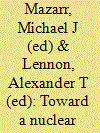

|
|
|
|
|
| Publication |
New York, St. Martin's press, 1994.
|
| Description |
x, 227p.
|
| Standard Number |
0312104049
|
|
|
|
|
|
|
|
|
|
|
|
Copies: C:1/I:0,R:0,Q:0
Circulation
| Accession# | Call# | Current Location | Status | Policy | Location |
| 037145 | 355.825119/MAZ 037145 | Main | On Shelf | General | |
|
|
|
|
| 15 |
ID:
053200
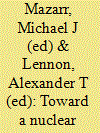

|
|
|
|
|
| Publication |
London, macmillan Press, 1994.
|
| Description |
227p.
|
| Standard Number |
033361500X
|
|
|
|
|
|
|
|
|
|
|
|
Copies: C:1/I:0,R:0,Q:0
Circulation
| Accession# | Call# | Current Location | Status | Policy | Location |
| 035826 | 355.825119/MAZ 035826 | Main | On Shelf | General | |
|
|
|
|
| 16 |
ID:
006326


|
|
|
|
|
| Publication |
Boulder, Westview Press, 1994.
|
| Description |
xiv, 290p.
|
| Standard Number |
0813322928
|
|
|
|
|
|
|
|
|
|
|
|
Copies: C:1/I:0,R:0,Q:0
Circulation
| Accession# | Call# | Current Location | Status | Policy | Location |
| 037603 | 355.033573/EDE 037603 | Main | On Shelf | General | |
|
|
|
|
| 17 |
ID:
173659


|
|
|
|
|
| Summary/Abstract |
Such a norm could prohibit cyber attacks on physical infrastructure, interference in electoral processes and divisive informational campaigns.
|
|
|
|
|
|
|
|
|
|
|
|
|
|
|
|
|
|
|
|
|